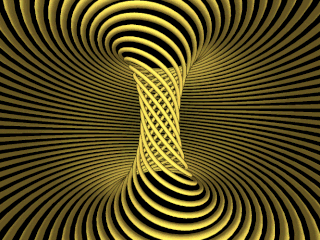LightSpaceTimeCoords
The (1+1)D spacetime is woven by two threads of light which are marked by two currents of circles (positive P ○○○ & negative N ○○○). These two threads are actually two halves of an ever changing unithread which in its turn is an ever cycling circle in those of the UniThread.
Each incidence of of these two threads is an eye (⦝) moving through spacetime as the threads streaming across each other.
- Subjectively, we see the eyes fixed at the root while the spacetime moving backward, Objectively, we see the spacetime fixed while the eyes moving forward.
- Photons are projections of those markers on the threads onto space axis. The grid (fabric) of spacetime is woven by the worldlines of these photons. (Turn off one light, P or N, to see how the photons trace their worldlines clearer.)
- In extensive view, the threads are straightened and we can only see they are incident at one (central) eye, but actually they are incident at many eyes. To see all incidences, we must turn to intensive view where the threads are folded into particles (each particle is represented as a lemniscate "∞"). Intensive view is the standard view of UniThread, while extensive view is the standard view of traditional physics, and they are dual to each other (mutually exclusive). Especially, objective spatial extensive view is the de facto view of traditional physics. Because traditionally, to mark the reference points for observers (eyes), we use markers on space axis (○○○), thus spatial view, instead of using markers on threads (○○○○○○) as in threaded view.
Time = P light + N light Space = P light - N lightThat relativity expresses in many ways: P thread (○↘) streaming right down + N thread (↙○) streaming left down = P photons moving rightward (●↣) + N photons moving leftward (↢●) = Eyes moving upward (⦝↑) & spacetime grid moving downward (▩↓) = Light wave spreading outward and inward = Two threads crossing at the eyes. Hiding one light (P or N), you can see the relativity expresses as the screwing effect or barber-pole illusion, too. And here's the quote from my post "Spirorus, the structure of spacetime ;)" in 2013:
Your particles move forward or my waves spread outward or we just turn around, there's no difference!
